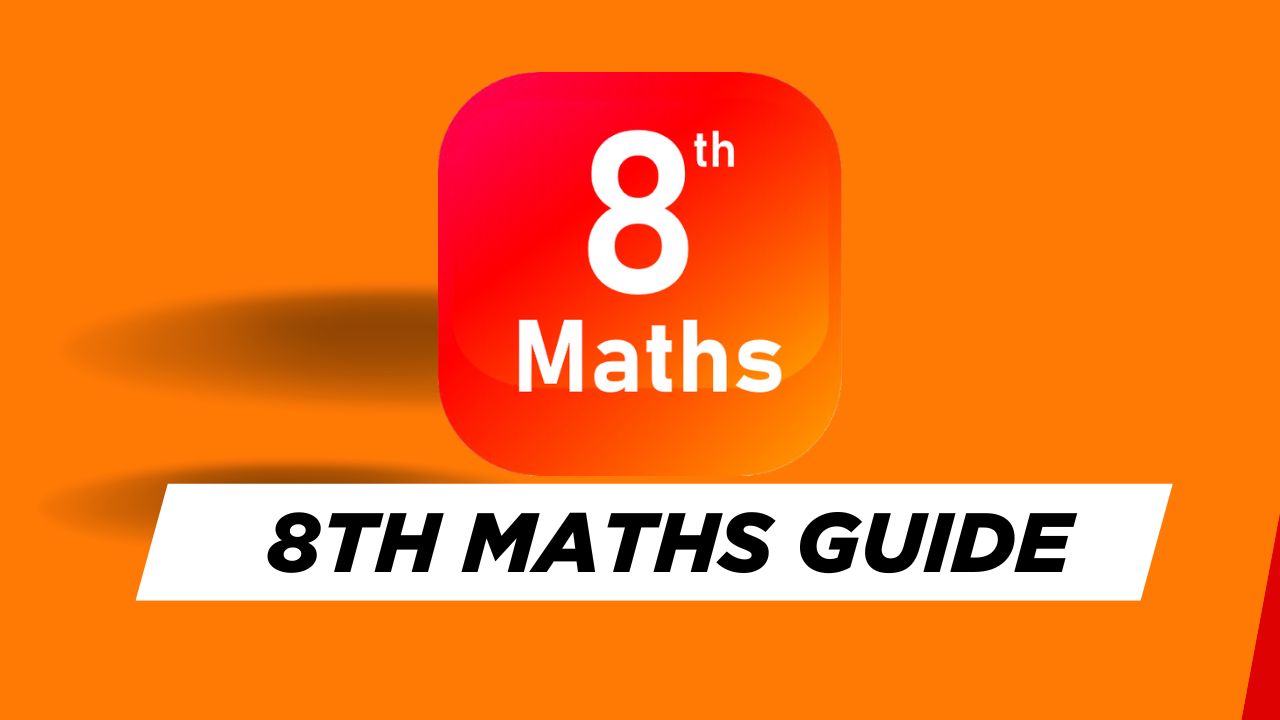
Mathematics in Class 8 is an essential foundation for future academic success. It shapes your problem-solving abilities and critical thinking. This guide will walk you through everything you need to know to excel in Class 8 Maths, with a focus on the CBSE curriculum and helpful tips to boost your performance.
Contents
What Topics Are Covered in Class 8 Maths?
Class 8 Maths introduces new concepts while reinforcing what you learned earlier. Here’s a breakdown of the chapters:
-
Rational Numbers:
Understand fractions, decimals, and their operations. Learn to work with both positive and negative numbers. -
Linear Equations in One Variable:
Learn how to solve equations like 2x + 5 = 15. You’ll solve problems step-by-step, making abstract algebra concrete. -
Understanding Quadrilaterals:
Study various four-sided figures such as squares, rectangles, and parallelograms. Learn their properties and theorems. -
Practical Geometry:
Gain hands-on experience in drawing geometrical shapes using a compass, ruler, and protractor. -
Data Handling:
Learn how to represent data using bar graphs, pie charts, and histograms. This chapter is essential for interpreting real-world data. -
Squares and Square Roots:
Understand perfect squares, their square roots, and how to simplify them. -
Cubes and Cube Roots:
Learn about cubes of numbers and their cube roots. -
Comparing Quantities:
Explore concepts like percentages, ratios, and proportions, which have real-world applications in finance, discounts, and investments. -
Algebraic Expressions and Identities:
This is a key chapter, where you’ll learn to simplify expressions like (a + b)² using basic algebraic formulas. -
Visualising Solid Shapes:
Study the 3D shapes such as cubes, spheres, and cones. Understand their properties and how to calculate their volume and surface area. -
Mensuration:
Learn to calculate the area and volume of various shapes like circles, triangles, and solids (e.g., cylinders). -
Exponents and Powers:
Get familiar with the laws of exponents and their applications in simplifying large numbers. -
Direct and Inverse Proportions:
Explore how two quantities change in relation to each other, such as speed and time.
Top Resources for Learning Class 8 Maths
To excel in Class 8 Maths, using the right resources is crucial:
-
NCERT Textbook: The primary book for your studies. It covers all the topics in detail and follows the latest CBSE syllabus.
-
NCERT Solutions: These provide step-by-step solutions to all textbook problems. Refer to them whenever you face difficulties.
-
Reference Books:
-
RD Sharma: A great resource for conceptual clarity and extra practice.
-
RS Aggarwal: Offers a variety of problems to sharpen your problem-solving skills.
-
-
Online Platforms:
-
BYJU’s: Offers interactive lessons and quizzes.
-
Vedantu: Provides live classes and doubt-solving sessions.
-
Khan Academy: Free videos to help you grasp difficult concepts.
-
Effective Tips for Studying Class 8 Maths
-
Conceptual Understanding:
Focus on understanding the logic behind every concept. It’s not just about memorizing formulas, but about knowing why and how they work. -
Practice Regularly:
The more problems you solve, the more confident you’ll get. Don’t skip practice, especially in Algebra and Mensuration. -
Use Visuals:
Draw diagrams, graphs, and shapes to better understand concepts like geometry and data handling. -
Solve Sample Papers:
Familiarize yourself with the exam pattern. Solving previous years’ papers will help you gain confidence and manage time effectively during exams. -
Group Study:
Sometimes, studying in a group helps you see things from different perspectives. Discussing tough problems with peers can improve understanding.
Why is Class 8 Maths Important?
Mastering Class 8 Maths is vital because it shapes your problem-solving and logical thinking abilities. The concepts you learn here are foundational for higher studies in Mathematics, Science, and Engineering. Moreover, real-life applications of topics like Data Handling, Mensuration, and Comparing Quantities are everywhere—from budgeting to cooking.
Key Expert Insights
Dr. Ramesh Kumar, an experienced teacher from Delhi, emphasizes:
“Class 8 is a turning point for many students. The concepts you learn in this year will help you tackle complex topics in higher classes, so don’t take it lightly!”
Class 8 Maths in Numbers
-
85% of students in India find Mensuration to be the most challenging topic.
-
90% of students who solve previous year’s questions regularly score higher marks in exams.
-
70% of students prefer using online video tutorials to understand difficult concepts.
Frequently Asked Questions (FAQs)
Q1: How can I improve my speed in solving Maths problems?
A1: Start by practicing easy problems to build confidence, and gradually increase the difficulty level. Set a timer to simulate exam conditions.
Q2: Are reference books necessary?
A2: While the NCERT textbook is sufficient, reference books like RD Sharma and RS Aggarwal offer extra practice problems and alternate approaches.
Q3: How do I prepare for exams effectively?
A3: Focus on revising each chapter, solving sample papers, and revisiting difficult concepts. Take mock tests to evaluate your progress.
Q4: Can online resources replace textbooks?
A4: Online resources are helpful for revision and understanding difficult topics, but the NCERT textbook should be your primary reference.
Conclusion
Class 8 Maths can be challenging, but with the right mindset and study techniques, you can master it. Stay consistent with your practice, use the right resources, and understand the concepts deeply. Remember, the effort you put in today will set you up for success in higher studies and in real-life applications.

